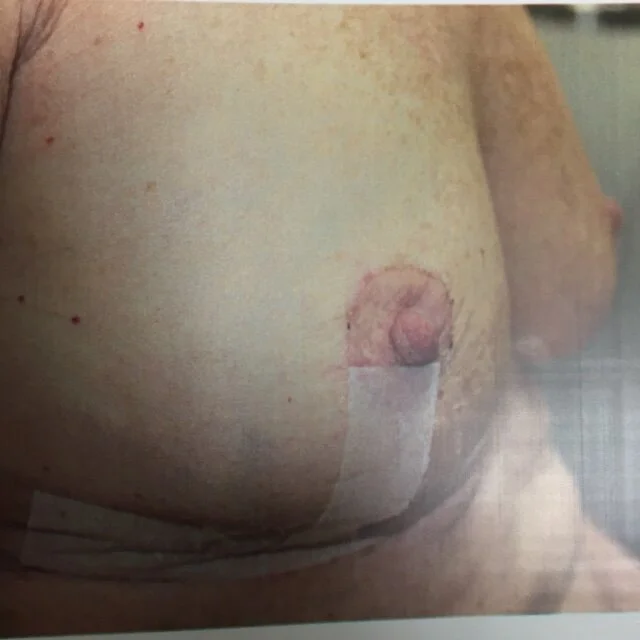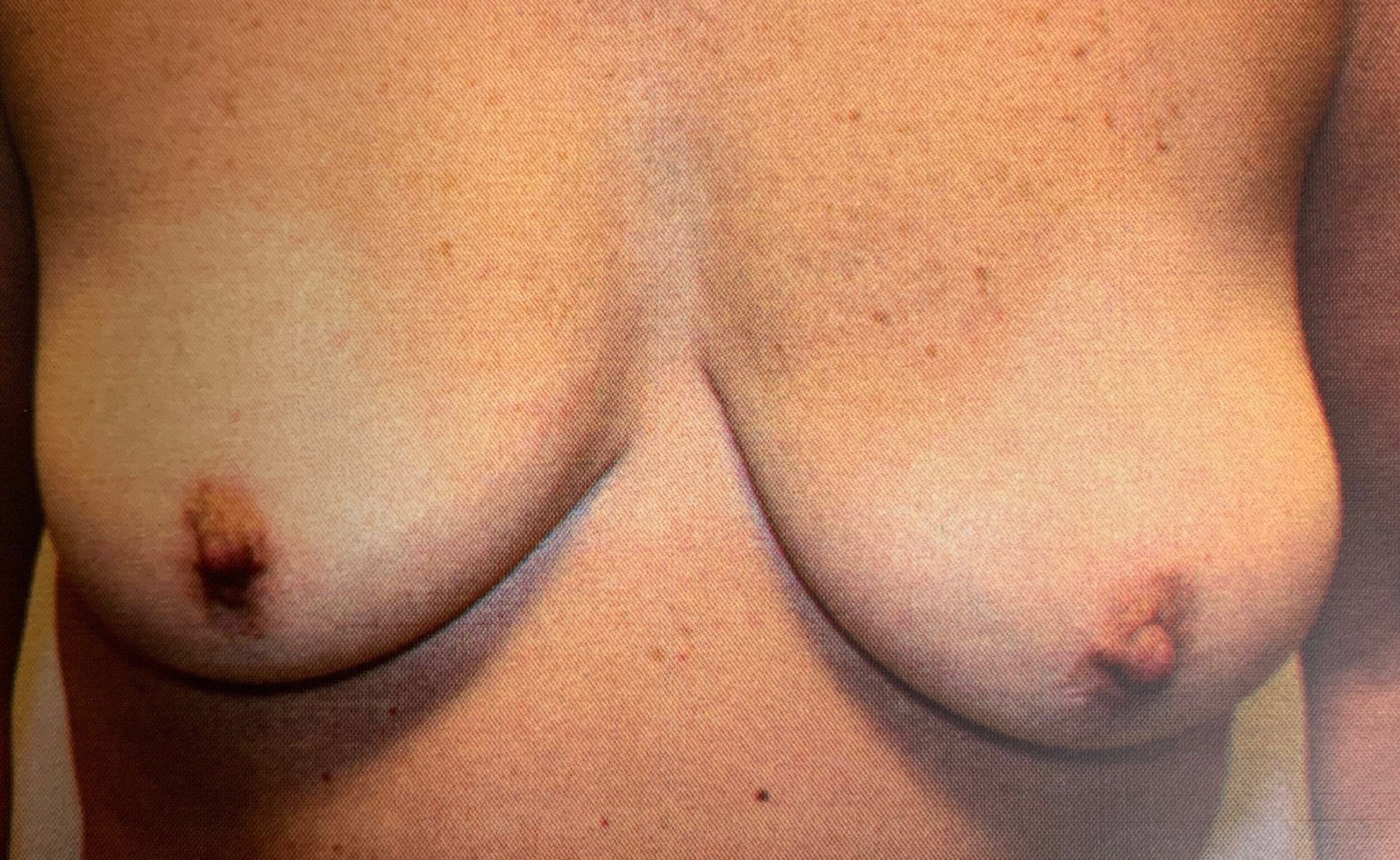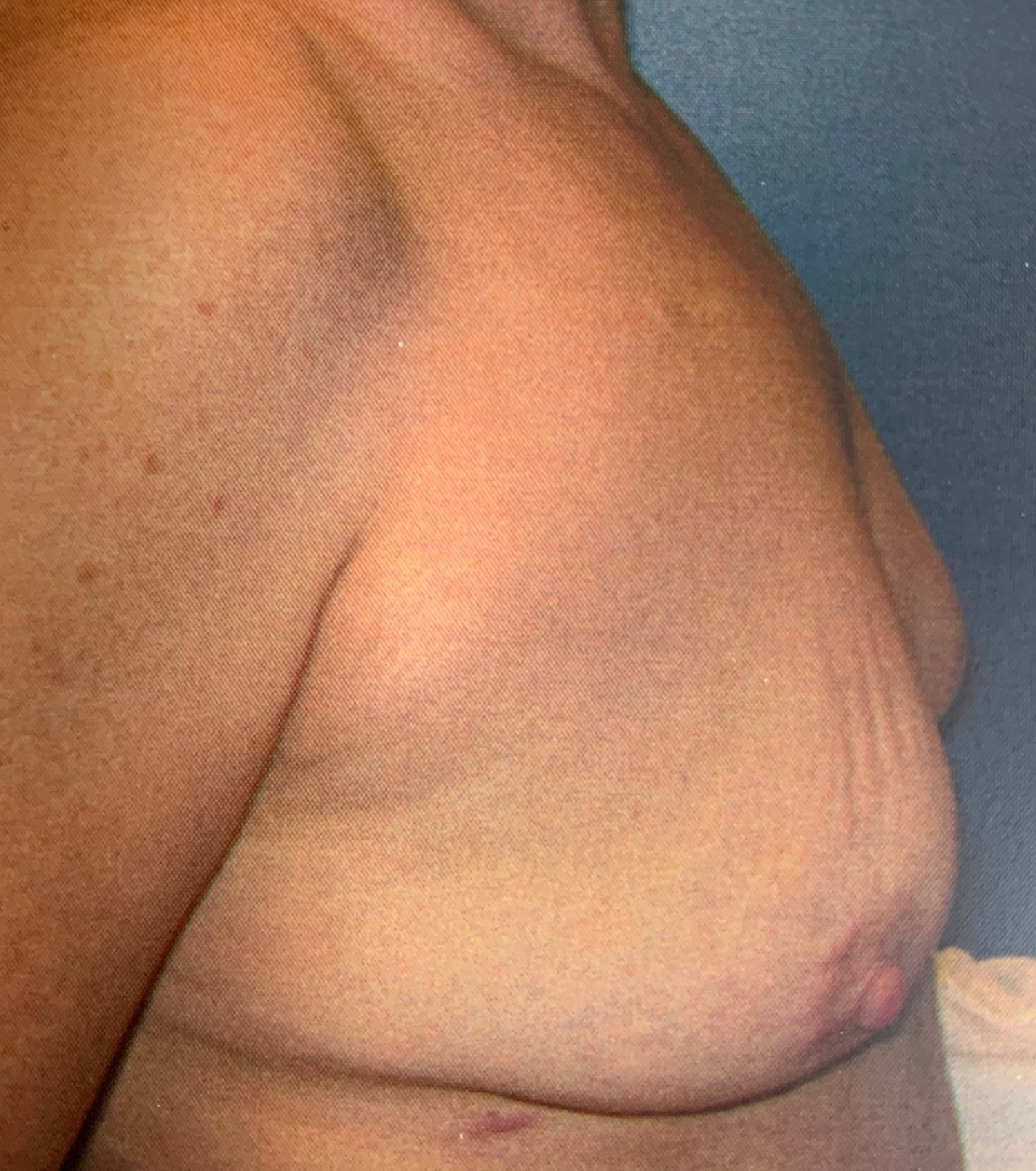
Breast Lift
*DISCLAIMER: THIS SITE CONTAINS GRAPHIC & SURGICAL IMAGES THAT MAY BE DISTURBING TO SOME VIEWERS.
THIS SITE IS INTENDED FOR INDIVIDUALS OVER THE AGE OF 18.
**None of the images on this site have been enhanced or photoshopped.
Patient B - Pre operative and 6 weeks Post-Operative following a breast lift and subpectoral Breast Augmentation


Patient H - Pre operative and 6 weeks Post-Operative Breast Lift and Sub Muscular Augmentation


Before & After Photos
*Tap a patient image to enlarge & view the full series of pre and post-operative images.
Before the Surgery:
+ What is the perfect breast?
Symmetry (both breasts are very similar in size and shape). 40% of the breast volume lies above the nipple areolar complex, and 60% lies below. The nipple areolar complex is at the apex of the breast mound, with a gentle lower and lateral curve of the breast mound meeting the chest wall, at a defined crease, which matches the opposite breast.
+ What is a Breast Lift?
This is a day surgery procedure, (the patient returns home the same day), done with the patient asleep, (General Anesthesia), where the size and the shape of the breast is surgically changed to improve the breast shape, posture, and size.
+ Who can have a Breast Lift or Reduction?
The youngest age is after full breast growth is complete (Age 18-19); there is no limit to an older patient having a Breast Lift, (the patient must be in good general health in order to have a General Anesthetic).
There are young patients who have developmental abnormalities of the breast, that may be corrected in the peripubertal age period.
The Operation:
+ How is it done?
- The surgeon will draw on your breasts before the surgery. *Please refer to Patient D above.
- The nipple areola and the breast will be elevated and reshaped into a more pleasing posture.
- You will require a General Anaesthetic.
- The surgery takes 1 1/2hours - 2 hours.
- The breast shape and size will then be adjusted surgically. The nipple areola will be elevated to the correct position on the breast, leaving the blood and nerve supply intact. The breast tissue is reshaped, the incisions are closed with stitches underneath the skin. These sutures will dissolve.
- If the breast shape is being adjusted but NOT the breast size, then only skin is removed, and the breast is reshaped.
- If the size and shape is being adjusted, then BOTH skin and breast tissue are removed, and the breast is reshaped.
- If one breast is larger than the other (called Breast Asymmetry), then breast tissue is removed from the larger breast, to match the smaller breast.
Please visit https://www.meadowlarksurgicalcosmetic.com for more information about Breast Lift
+ How long does the operation last?
Approximately an hour to an hour and one half.
+ Where is the surgery performed?
Dr. Giuffre uses a private surgical suite adjacent to his Meadowlark Health Centre Office (#176), for his cosmetic procedures, (see https://www.meadowlarksurgicalcosmetic.com.
If a procedure qualifies for Alberta Health Care Coverage, the procedure would be done at a city hospital. The determination of whether a procedure is or is not covered by AHS does not depend on a referral from a Family Doctor or Specialist. Dr. Giuffre will advocate for the AHS coverage for his patients within the limits and guidelines set out by AHS.
+ How do I know that I need a Breast Lift?
If the breasts have lost or never had a high perky posture, the surgery to correct this loss of a pleasing shape is a Breast Lift. The loss of a youthful shape can be caused by abnormal breast development, pregnancy, breast feeding, weight gain, weight loss, aging, and the effects of gravity.
The nipple areola drops and the breast drops, (this is called Ptosis). Tap show more to see photos of Ptosis below.
+ How do I know that I need a Breast Lift (cont)?
The degree of Ptosis is measured by the position of the nipple in relation to the lower crease of the breast, (inframammary crease). If the nipple sits at, or below this crease, when looking at the breast in profile, then a Breast Lift is a consideration. If the majority of the breast tissue has fallen below this crease, leaving the upper part of the breast empty, (called Pseudoptosis), a Breast Lift is a consideration.
If the breast has developed abnormally, with both breast and nipple abnormalities (Tuberous Breast), a Breast Lift is part of the Breast Reconstruction . A surgical consultation and examination with Dr. Giuffre will provide the surgical options to correct Breast Asymmetry (caused by differences in breast size and shape), or concerns about breast size or shape.
+ What if my breasts are large and have Ptosis?
If your breasts are moderately large, and have lost some of their shape, a Breast Lift and Breast Reduction are the surgical procedures performed to correct this problem. Both procedures are performed during the same operation. If the breasts are very large, the procedure may be covered by Alberta Health Services. Alberta Health Services requires a minimum amount of breast tissue to be removed in order to qualify for coverage. Dr. Giuffre will advise you in this regard.
+ What if my breasts are small, I have Ptosis, and I would like larger, more youthful breasts?
At the same time as correcting the breast shape, using a Breast Lift, a combination of a Breast Lift and Breast Augmentation can be done. Before the surgery, the same planning is done for the Breast Lift. Through the incisions, made for the Breast Lift, a breast implant can be inserted at the same time. The combination of both a Breast Lift and Breast Augmentation will produce a larger more youthful breast. *Please refer to Patient E and Patient H above.
+ I'm not sure I want my breast to be that much bigger, but the upper part of my breast is empty and my breasts droop. What can I do?
A Breast Lift will improve the nipple position, breast shape and posture, but will not restore upper pole fullness. A Breast Augmentation can restore this upper pole fullness. This can be done at the same time as the Breast Lift surgery, or later, with a second surgery.
+ My breasts are quite droopy. Can you fix this with a Breast Augmentation?
This depends on how severe the droop (ptosis) is. If it is minor, a Breast Augmentation can often correct the ptosis. If the droop is more significant, then a Breast Lift would be required, along with a Breast Augmentation (if the patient also wanted larger breasts). If the patient wanted only the breast ptosis correction, without enlarging the breasts, then only a Breast Lift would be done.
+ My nipples are at different heights. Can you fix this with a Breast Augmentation?
No, this correction requires a form of Breast Lift surgery.
+ Can a Breast Lift be done without leaving scars?
In order to lift the breast, and reposition the nipple areola, three breast incisions must be made, which will leave a scar.
There will be a scar around the areola, where the dark and lighter skin join. This scar blends and fades.
There will be a scar in the breast crease, which is well hidden within the crease.
There will be a vertical scar from the bottom of the areola to the crease. This often looks like a stretch mark when fully healed.
*Please refer to Patient F and Patient G above.
+ One breast is a bit smaller than the other. Can this be fixed?
It is unusual for the breasts to be identical. They often differ in size and shape. Adjusting implant size can often correct a minor size symmetry issue. If the size and shape and nipple height are dramatically different between the breasts, then additional surgical options would be considered at the time of breast implantation, such as a Breast Lift and/or Breast Reduction. The surgical options, and associated risks, would be thoroughly discussed by Dr. Giuffre, before deciding on a procedure. Contact Dr. Giuffre's office for a Consultation.
+ Is the procedure painful?
Before waking from the surgery, Dr. Giuffre will inject a long acting local anesthetic into the breast area to decrease any immediate breast discomfort from the surgery. When the freezing wears off, you will require postoperative analgesic medication, (pain killers) for up to one week. The discomfort typically subsides after the first two days following the surgery.
Patients taking prescription pain killers should not drive a car, operate machinery, or sign significant documents while taking the medication.
The Risks:
+ What are the risks of doing Breast Lift Surgery?
With any surgery, there are surgical and anesthetic risks. Aside from the rare risks of an anesthetic event, some of the general and specific surgical risks for this procedure would include:
- Scarring
- Infection
- Sensation changes to the Breast or Nipple
- Circulation loss to the nipple - if you smoke, you must stop at least 2 weeks before and 2 weeks after surgery **Patients at risk are those that smoke, have had radiation for breast cancer, and have an abnormal circulation pattern of the nipple.
- Discomfort
- Time off of work and exercise
- Asymmetry
- Bleeding (Hematoma)
Please note that this list is not complete. During the consultation with the patient, Dr. Giuffre will outline and explain each of the risks in detail.
+ What about Mammograms? Can I have a Mammogram after a Breast Lift? How often?
A mammogram can be done after a Breast Lift or Reduction. It is recommended that the patient wait one year after the surgical procedure before doing a Mammogram. It is recommended that a patient contemplating a Breast Lift or Reduction, have a Mammogram done prior to the surgical procedure. This is particularly important if there is a family history of breast cancer.
In Alberta, if there is a family history of breast cancer, the first mammogram should be done at age 40. If there is no family history of breast cancer, then a Mammogram is recommended at age 50.
Every woman should examine their breasts monthly, one week after their menstrual period, for lumps. This is best accomplished during a shower.
If a patient feels anything suspicious, contact your Family Doctor immediately for further assessment, investigation, and referral.
+ Am I at higher risks of having breast cancer if I have a Breast Lift/Reduction?
No, you have no increased risks of developing breast cancer.
Any breast tissue that is removed at surgery is sent for histopathology assessment.
*Please refer to FAQ above.
+ Can I have a Breast Lift/Reduction before getting pregnant and having a family?
Yes. Although a Breast Lift or Breast Reduction does not interfere with a woman's natural response to the hormones of pregnancy and breast feeding, the ability to successfully breast feed following this procedure is unknown. If breast feeding is a priority, Dr. Giuffre's recommendation is to defer this procedure until after you have completed your family.
Because of the changes that occur to the breast during pregnancy and breast feeding, some women's breast size and shape will change after pregnancy and breast feeding. This may affect your surgical result if done before pregnancy.
+ Will I lose sensation in my nipples after Breast Lift/Reduction?
There is a specific nerve that goes to the nipple that provides sensation and creates an erect nipple when you are cold. That nerve is not in the anatomic field when a Breast Lift/Reduction is done, unless there is an unusual anatomic variant. As a general rule, there is a very small percentage (<1%) data-preserve-html-node="true" of patients that comment on a nipple sensation change. The sensation change in the nipple could either increase, (due to the increased projection of the breast) or decrease (less common) following a Breast Augmentation.
+ I have heard that my nipple could die with a Breast Lift or Breast Reduction.
What keeps your nipple alive is the blood circulation. Anything that decreases the blood flow to the nipple can cause the nipple to react by turning white or blue, not much different than tying a tight string around your finger. If the circulation is not improved, and the finger remains blue or white for a prolonged period, then some, or all of the finger tissue will die. This is called Necrosis. Patients at risk are those that smoke, have had radiation for breast cancer, and have an abnormal circulation pattern to the nipple. Although rare, this can happen to a healthy breast in a healthy patient. If a partial or full nipple loss occurred, a Nipple Reconstruction could be done after the breast has healed, similar to the Reconstruction that is done for a breast cancer patient.
*Please refer to Patient Images below.
The Complications:
+ I have had a Breast Lift/Reduction in the past. Do I need to have it redone?
If you are happy with the size and shape of your result, you do not have to have the surgery redone. If you have undergone pregnancy, breast feeding, weight gain or weight loss, or many years have passed since your Breast Lift/Reduction, and you are unhappy with the size, shape, and posture of the breast, the surgery can be redone.
+ Can I use the fat (fat graft) from other parts of my body to enlarge my breasts?
There are some centres experimenting with using only the patients fat to augment the breast. It is not considered standard of care for breast augmentation. Long term results will need to be evaluated. This technique is used primarily to assist in improving the contour of an already reconstructed breast following breast cancer surgery. To improve the upper pole of the breast, after breast lift surgery, fat grafting to augment the upper pole of the breast, to a limited extent, can be done.
+ Are there before and after pictures?
Yes. Every patient that Dr. Giuffre operates on, for cosmetic reasons, will have a pre-operative photograph taken. At the 6 week check up with Dr. Giuffre, his patients are given an 8 x 10 preoperative photograph.
Post-operative photos are taken in some instances.
The Followup:
+ How often do I need to come back for a checkup after surgery?
Postoperative visits include a 24 hour visit, a 1 week visit, and a 6 week visit. If there are any patient concerns, Dr. Giuffre provides his home phone number for patient's direct access. After the 6 week visit, if there are any future requests for an appointment, they are made directly with Dr. Giuffre's office and an expedited visit is arranged.
+ I no longer have access to my original surgeon. What can I do?
For cosmetic or reconstructive concerns, patients are invited to contact Dr. Giuffre's office (780-428-7737) for an appointment. He does not require a referral and there is no charge for the consultation.
+ I had a Breast Lift/Reduction with another surgeon and I am unhappy. What can I do?
It is always wise to re-consult with your original surgeon, in order that he/she can assess you and your concerns. If that fails, or you are still unhappy with your options, you can always seek a second opinion. Dr. Giuffre would communicate your concerns with your original surgeon in order to facilitate a resolution.
+ I had a Breast Lift/Reduction in another country. I have a problem. What can I do?
For cosmetic or reconstructive concerns, patients are invited to contact Dr. Giuffre's office (780-428-7737) for an appointment. He does not require a referral. There is no charge for the consultation.
+ I had a Breast Lift/Reduction years ago. My breasts are changing and have lost their youthful shape. What can I do?
This can happen from weight change, pregnancy and breast feeding, aging, and menopause. A consultation with a Plastic Surgeon is recommended to review the cause, and discuss options for improvement. Contact (780-428-7737) for an appointment.
+ I had a Breast Lift/Reduction before I had children. After my babies and breast feeding, my breasts have changed and have lost their shape. What can I do?
A consultation is necessary. There are a number of surgical options that could include a Breast Augmentation, a Breast Lift, and/or Breast Reduction, or, any combination of these to recreate a youthful aesthetically attractive breast.
+ I had a Breast Augmentation. I don't want the implants anymore. I want to go back to my natural non-augmented breast. I am afraid my breasts will be droopy. What can I do?
A consultation is necessary. Your breasts, implant type, and location, will be assessed. The surgical options may be as simple as just removing the implant under local anesthetic, or, more complicated, requiring a general anesthetic, to remove the implant and all of the surrounding capsular scar tissue around the implant. If after removing the implant, the posture of the breast is droopy (ptotic), the correction is a Breast Lift. This could be done at the same time as the implant removal or, it could be done at a later date. If a Breast Lift is being done at the same time the implants are being removed then a general anesthetic is required.
Financing:
+ Does the public heath care system cover any of the costs of a Breast Lift or Breast Reduction? What about private insurance?
Alberta Health Services will cover Breast Reconstruction, for patients who have been treated for breast cancer. They do not cover breast surgery for aesthetic reasons, even with a family doctor referral, or a psychiatric or psychological referral.
Private insurance may cover the cost. Please contact your insurance company for written confirmation of coverage. Alberta Health Services will cover Breast Reduction surgery in certain circumstances. Please contact Dr. Giuffre’s office for a consultation.
+ Can I use the costs of Breast Lift/Reduction as a tax deduction?
CRA eliminated the use of cosmetic surgery as a tax deduction a number of years ago. Unless you can demonstrate the procedure is a promotional cost for your business, it is not tax deductible. If there is a medical need, confirmed by your doctor, you may be able to deduct the cost with a letter from your doctor, outlining the medical need/necessity for the procedure, along with the receipt for surgery.
+ Can I finance the costs of the surgery? How do I do this?
Dr. Giuffre does not provide in house financing for cosmetic procedures. There are a number of companies across Canada that will finance cosmetic surgery, not much different than car financing or mortgages. Please refer to the links provided for this information.
** Dr. Giuffre has NO financial or business relationship, or affiliation with any of these companies.
+ If something goes wrong, do I have to repay for the operation?
You do not have to pay for the treatment of an immediate complication. In the unusual event that there is a problem with your original surgery, such as a breast deformity, you do not have to pay for the correction.
Breast changes that occur from, lifestyle choices and time, are subject to a fee.
+ How much does it cost?
The cost of cosmetic surgery is covered entirely by the patient. The one fee would include the cost of the anesthetist, (who provides the General Anesthetic), the cost of the implants, the rental of the operating room and equipment, the rental of the recovery room and equipment, the staff, including the nurses and administration staff, as well as the surgical fee. The cost will vary depending on the duration of the procedure, and the quality and sophistication of the surgical facility, where the surgery is performed.
The fees will be discussed at the time of consultation with Dr. Giuffre, after the patient has made their procedure choices. There is no obligation to proceed with the surgery following the consultation. The patient is referred to our websites, and is invited back for a second consultation if need be.
Our office will endeavour to expedite a surgical procedure to accommodate both business and family obligations.
All fees are receipted.
+ What about having my Cosmetic Surgery in another country where it is cheaper?
There is current trend to have surgery out of your country where the surgery may be cheaper.
We call this "Tourist Surgery."
There are a number of additional risks to do this which include:
the Surgical skill, experience, licensing and education of an unknown surgeon.
Canada has very strict rules and requirements to be a licensed Plastic Surgeon (FRCS(C)) in our country. Your Plastic Surgeon has completed an undergraduate degree (4 years), an MD degree (4 years), a Fellowship Degree in Plastic Surgery (5 years) and often a post Fellowship (1-2 years).
A "friend" is not a good reference, nor is glitzy advertising.
The use of off market breast implants (not approved by the regulatory bodies like the Canada Health Protection Agency, or the FDA in the USA). These implants are substandard, not guaranteed and are unreliable.
The safety, sterility and equipment quality including anaesthesia machines in the hospital or private surgical suite; this may lead to increased risk of infection and anaesthetic risks.
Post operative care is limited to the time you spend in their country. If you have a complication, to see your original surgeon, you will have to fly back or see a new surgeon in your own country.
If you have an unsatisfactory result, you will have to fly back to see your original surgeon or find a new local Plastic Surgeon. The cost of the repair may exceed what you originally paid, and the final result, fixing a mistake, is often not as good as it could have been, had the surgery been done correctly the first time.
After accounting for the accumulated costs of the air travel, hotel, surgery and post operative care, the perceived cost savings may not be significant.
If you have a severe, life threatening complication, Alberta Health Care will cover the medical costs for your care. Correcting the reconstructive problem as a result of the complication would be the patient's financial responsibility.
“Life is full of choices; your character reflects those choices.”

























































































